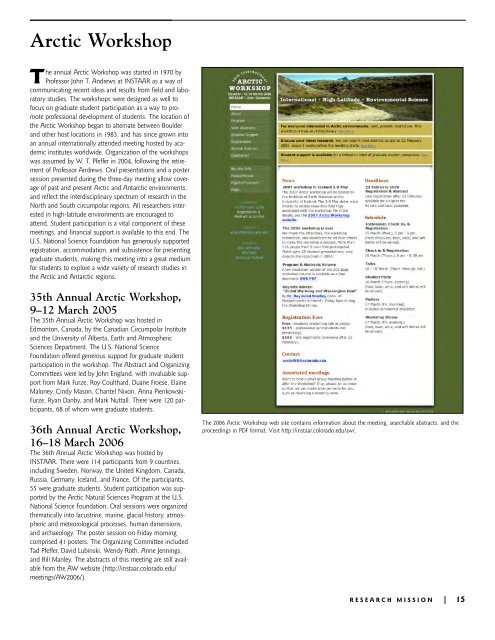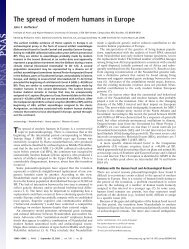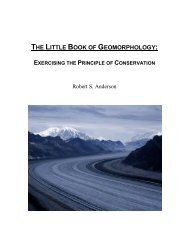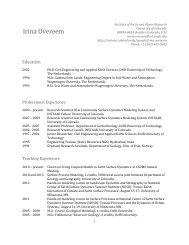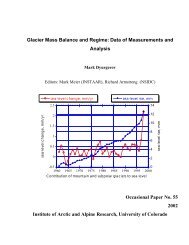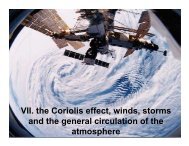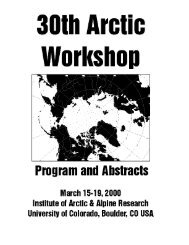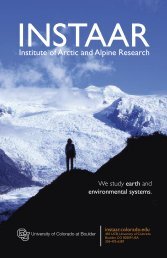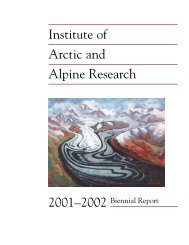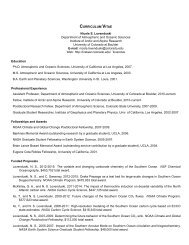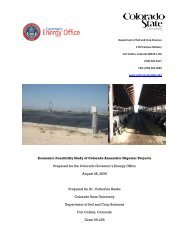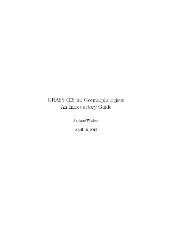00_cover_Biennial Report 05-06.qxd - INSTAAR - University of ...
00_cover_Biennial Report 05-06.qxd - INSTAAR - University of ...
00_cover_Biennial Report 05-06.qxd - INSTAAR - University of ...
- No tags were found...
Create successful ePaper yourself
Turn your PDF publications into a flip-book with our unique Google optimized e-Paper software.
Arctic WorkshopThe annual Arctic Workshop was started in 1970 byPr<strong>of</strong>essor John T. Andrews at <strong>INSTAAR</strong> as a way <strong>of</strong>communicating recent ideas and results from field and laboratorystudies. The workshops were designed as well t<strong>of</strong>ocus on graduate student participation as a way to promotepr<strong>of</strong>essional development <strong>of</strong> students. The location <strong>of</strong>the Arctic Workshop began to alternate between Boulderand other host locations in 1983, and has since grown intoan annual internationally attended meeting hosted by academicinstitutes worldwide. Organization <strong>of</strong> the workshopswas assumed by W. T. Pfeffer in 2<strong>00</strong>4, following the retirement<strong>of</strong> Pr<strong>of</strong>essor Andrews. Oral presentations and a postersession presented during the three-day meeting allow <strong>cover</strong>age<strong>of</strong> past and present Arctic and Antarctic environments,and reflect the interdisciplinary spectrum <strong>of</strong> research in theNorth and South circumpolar regions. All researchers interestedin high-latitude environments are encouraged toattend. Student participation is a vital component <strong>of</strong> thesemeetings, and financial support is available to this end. TheU.S. National Science Foundation has generously supportedregistration, accommodation, and subsistence for presentinggraduate students, making this meeting into a great mediumfor students to explore a wide variety <strong>of</strong> research studies inthe Arctic and Antarctic regions.35th Annual Arctic Workshop,9–12 March 2<strong>00</strong>5The 35th Annual Arctic Workshop was hosted inEdmonton, Canada, by the Canadian Circumpolar Instituteand the <strong>University</strong> <strong>of</strong> Alberta, Earth and AtmosphericSciences Department. The U.S. National ScienceFoundation <strong>of</strong>fered generous support for graduate studentparticipation in the workshop. The Abstract and OrganizingCommittees were led by John England, with invaluable supportfrom Mark Furze, Roy Coulthard, Duane Froese, ElaineMaloney, Cindy Mason, Chantel Nixon, Anna Pienkowski-Furze, Ryan Danby, and Mark Nuttall. There were 120 participants,68 <strong>of</strong> whom were graduate students.36th Annual Arctic Workshop,16–18 March 2<strong>00</strong>6The 36th Annual Arctic Workshop was hosted by<strong>INSTAAR</strong>. There were 114 participants from 9 countries,including Sweden, Norway, the United Kingdom, Canada,Russia, Germany, Iceland, and France. Of the participants,55 were graduate students. Student participation was supportedby the Arctic Natural Sciences Program at the U.S.National Science Foundation. Oral sessions were organizedthematically into lacustrine, marine, glacial history, atmosphericand meteorological processes, human dimensions,and archaeology. The poster session on Friday morningcomprised 41 posters. The Organizing Committee includedTad Pfeffer, David Lubinski, Wendy Roth, Anne Jennings,and Bill Manley. The abstracts <strong>of</strong> this meeting are still availablefrom the AW website (http://instaar.colorado.edu/meetings/AW2<strong>00</strong>6/).The 2<strong>00</strong>6 Arctic Workshop web site contains information about the meeting, searchable abstracts, and theproceedings in PDF format. Visit http://instaar.colorado.edu/aw/.RESEARCH MISSION | 15


